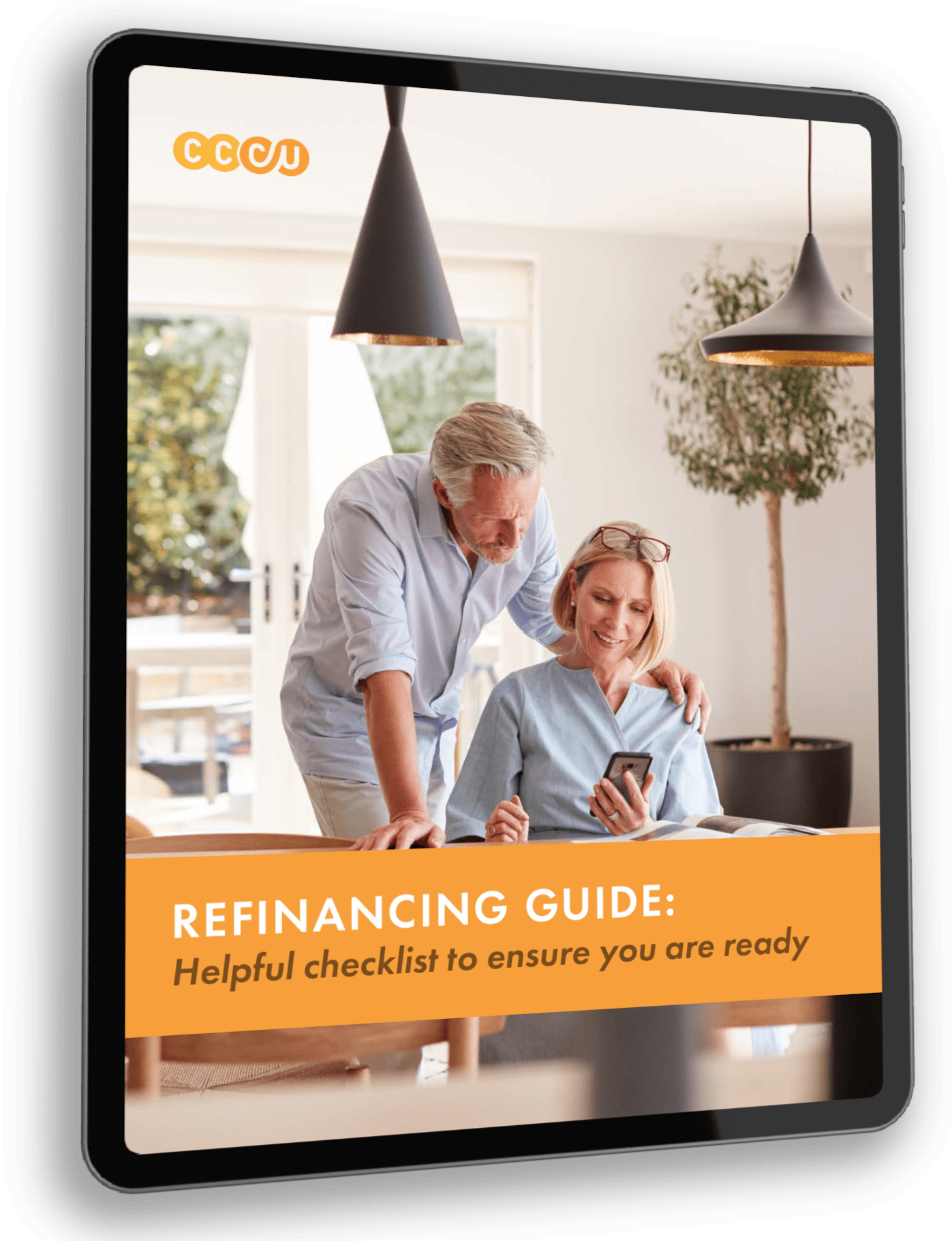Your perfect mortgage exists.
Mortgage Benefits
We specialize in mortgage lending, with adjustable and fixed-rate loans being the most popular options for a standard mortgage or refinance of a primary or secondary residence. CCCU offers many other mortgage options specific to first-time home buyers, veterans, physicians, and more. Be sure to check out all of our mortgage options below.

Competitive Rates
Buydown Option
Local, Fast Service
Free Consultation
MORTGAGE RATES | REFINANCE RATES
[1] APR=Annual Percentage Rate. Actual APR based on creditworthiness, purchase price, and down payment amount. Adjustable rates are subject to change during the loan term. That change can increase or decrease your monthly payment. Rates include a 1% loan fee, are based on purchase of primary residence, and are subject to change without notice. Contact credit union for more details.
[1] APR=Annual Percentage Rate. Actual APR based on creditworthiness, purchase price, and down payment amount. Adjustable rates are subject to change during the loan term. That change can increase or decrease your monthly payment. Rates include a 1% loan fee, are based on purchase of primary residence, and are subject to change without notice. Contact credit union for more details.
Start your Mortgage application
What is a mortgage buydown?
Our buydown/interest rate reduction feature allows you to buy down the mortgage interest rate and pay more in up-front fees so you can reduce the interest and payments over time.
The fees you pay to reduce the rate are called discount points and each "point" is a fee equal to 1% of the loan amount. In some scenarios, your real estate agent may be able to negotiate that the seller credit you as the new home buyer toward buying points.
If you are unfamiliar with this concept but would like to explore how this reduction can lead to additional savings, let's talk!


Should I refinance my mortgage?
If you're looking to "find" some extra cash in your monthly budget, refinancing your home loan into a mortgage with a longer term may help. If you are looking to pay off your existing mortgage faster, refinancing into a shorter mortgage term may lead to extra savings.
The best time to refinance your mortgage is when mortgage rates and refinance rates are lower than what you're currently paying on your existing mortgage. That is when you can count on extra savings in your pocket!
Don't forget, a cash-out refinance is always an option too. It's a type of mortgage refinance that lets you access the equity you have built over time in your home and supplies you with cash in exchange for a bigger mortgage. Many people use this method to consolidate their debt or make home improvements that will impact their home's resale value.
Mortgage Options
USDA Loans
Learn MoreFHA Loan
Learn MorePhysician Home Loan
Learn MoreFirst Time Home Buyer
Learn MoreVA Loan
Learn MoreITIN Mortgage
Learn MoreJumbo Loan
Learn MoreNo results found.

Discover if refinancing is right for you!
Our Refinancing: A Comprehensive Guide to Help Leverage Your Home's Value checklist will help you learn valuable information about mortgage refinancing so you can be better prepared.
Ready to get started? Download your guide now:
What our members are saying:
"Everything from getting the pre-approval to our actual mortgage for our new home was seamless. This was the most friendly, helpful and efficient process that anyone could hope to receive. Thank you everyone at CCCU!"
Larry D.“I am a first-time home buyer and Brandon/CCCU team made the process so easy while still getting the best rates available. Every question or concern, big or small, was answered so quickly. The personalized attention was so wonderful that I used them to also purchase my 2nd home years later. I highly recommend Brandon and his team!”
Ken N.“My mortgage loan officer, John VanLeeuwen, was kind and easygoing throughout my refinance. He was both knowledgeable and patient with all my questions, and he kept me informed at each stage of the process as to what was needed and what would happen next. He skillfully estimated the total amount to borrow such that we ended up with nearly a zero balance at closing! I'm very happy with the service I received.”
Zoe M.Related Mortgage Articles
Enjoy browsing our collection of recent articles relating to mortgages, home loans, and home-buying tips.
Mortgage Frequently Asked Questions
Do you offer any programs to help buyers save for their new home?
Yes, our CCCU First-Time Home Buyer Savings Account is a great tool to help you get started.
Depositors who are Oregon residents and have not owned a home in the last three years qualify to receive an Oregon state tax subtraction of up to $6,125 for a single filer, and $12,245 for joint filers per year. Plus, close your home loan through CCCU and get a FREE appraisal valued up to $700!
Learn more about this account and its benefits.
Do you have any favorite realtors you could recommend?
CCCU's Realtor Network gives you access to trusted realtors in the Portland area. As we work with realtors, we will update our website to ensure that you're getting the quality products and services you deserve, from mortgage pre-approval to your closing date.
- FEATURED REALTOR: William Gilliland, Windermere
With the exception of six years spent in Palm Springs, CA, William has lived in Oregon since 1984. A total of 17 years in Portland has given him the opportunity to live in each quadrant of the city. His natural curiosity and exploration of Portland's uniquely different neighborhoods has provided him with detailed and specific experience to help his clients make better real estate decisions.
William's real estate knowledge and customer satisfaction are a few of the many reasons CCCU has chosen him as one of our top preferred realtors.
You can reach William directly at 503-284-7755 or please visit his website at www.WGHomesPDX.com. - Sue Gomes
John L Scott
sue@suegomes.com
office: 503.222.9200
cell: 360.574.3889
suegomes.johnlscott.com - Amiee Virnig
Windermere
avirnig@windermere.com
office: 503.284.7755
cell: 503.803.7678
aimeevirnig.com - Sonya Jackson
Windermere Sandy
sonyaj@windermere.com
office: 503.668.4131
cell: 360.341.5363
sonyajackson.withwre.com - Tim Walters, P.C.
Re/Max Equity Group
timwalterspc@gmail.com
office: 503.545.1880
twalters.equitygroup.com - William Gilliland
Windermere
wgilliland@windermere.com
office: 503.284.7755
cell: 503.333.6475
wghomespdx.com - Bonnie Roseman
Living Room Realty
Portland@realtor.com
office: 503.719.5588
cell: 503.515.5973
rosecityroseman.com
What is title insurance and why do I need it?
If you've ever purchased a home before, you may already be familiar with the benefits and terms of title insurance. But if this is your first home loan or you are refinancing, you may be wondering why you need another insurance policy.
The answer is simple: The purchase of a home is most likely one of the most expensive and important purchases you will ever make. You, and especially your mortgage lender, want to make sure the property is indeed yours: That no individual or government entity has any right, lien, claim, or encumbrance on your property.
The function of a title insurance company is to make sure your rights and interests to the property are clear, that transfer of title takes place efficiently and correctly, and that your interests as a homebuyer are fully protected.
Title insurance companies provide services to buyers, sellers, real estate developers, builders, mortgage lenders, and others who have an interest in real estate transfer. Title companies typically issue two types of title policies:
1) Owner's Policy. This policy covers you, the homebuyer.
2) Lender's Policy. This policy covers the lending institution over the life of the loan.
Both types of policies are issued at the time of closing for a one-time premium, if the loan is a purchase. If you are refinancing your home, you probably already have an owner's policy that was issued when you purchased the property, so we'll only require that a lender's policy be issued.
Before issuing a policy, the title company performs an in-depth search of the public records to determine if anyone other than you has an interest in the property. The search may be performed by title company personnel using either public records or, more likely, the information contained in the company's own title plant.
After a thorough examination of the records, any title problems are usually found and can be cleared up prior to your purchase of the property. Once a title policy is issued, if any claim covered under your policy is ever filed against your property, the title company will pay the legal fees involved in the defense of your rights. They are also responsible to cover losses arising from a valid claim. This protection remains in effect as long as you or your heirs own the property.
The fact that title companies try to eliminate risks before they develop makes title insurance significantly different from other types of insurance. Most forms of insurance assume risks by providing financial protection through a pooling of risks for losses arising from an unforeseen future event, say a fire, accident or theft. On the other hand, the purpose of title insurance is to eliminate risks and prevent losses caused by defects in title that may have happened in the past.
This risk elimination has benefits to both the homebuyer and the title company. It minimizes the chances that adverse claims might be raised, thereby reducing the number of claims that have to be defended or satisfied. This keeps costs down for the title company and the premiums low for the homebuyer.
Buying a home is a big step emotionally and financially. With title insurance you are assured that any valid claim against your property will be borne by the title company, and that the odds of a claim being filed are slim indeed.
What is mortgage insurance and when is it required?
Mortgage insurance makes it possible for you to buy a home with less than a 20% down payment by protecting the lender against the additional risk associated with low down payment lending. Low down payment mortgages are becoming more and more popular, and by purchasing mortgage insurance, lenders are comfortable with very low or nonexistent down payments. It also provides you with the ability to buy a more expensive home than might be possible if a 20% down payment were required.
The mortgage insurance premium is based on loan-to-value ratio, type of loan, and amount of coverage required by the lender. Usually, the premium is included in your monthly payment and one to two months of the premium are collected as a required advance at closing.
For single family residences, it may be possible to cancel private mortgage insurance at some point, such as when your loan balance is reduced to a certain amount - below 75% to 80% of the property value. Recent federal legislation requires automatic termination of mortgage insurance for many borrowers when their loan balance has been amortized down to 78% of the original property value.
Do you offer portfolio loans for less-than-perfect credit?
Yes! CCCU takes pride in helping our members find a mortgage to purchase their dream home.
If you don't have perfect credit, no worries! Instead of the high standards typically required by third-party loan requirements, our portfolio loans have more flexible standards. As an added bonus, we keep the loan right here at CCCU so you won't have to deal with another mortgage company.
Who will help me if I have a question about my mortgage application?
CCCU offers a team of mortgage experts that are ready to help you from the beginning of the application through closing on your new home. Meet our mortgage team or call 503-797-7575 to get more information on a mortgage loan product.
Are there any fees charged for these loan programs?
A home loan often involves many fees, such as the appraisal fee, title charges, closing fees, and state or local taxes. These fees vary from state to state and also from lender to lender. Any lender or agent should be able to give you an estimate of their fees, but it is more difficult to tell which lenders have done their homework and are providing a complete and accurate estimate. We take quotes very seriously and pride ourselves on offering the best possible loan for each and every scenario!
To assist you in evaluating our fees, we've grouped them as follows:
Third Party Fees
Fees that we consider third party fees include the appraisal fee, the credit report fee, the settlement or closing fee, the survey fee, tax registration fees, title insurance fees, and flood certification fees. Third party fees are fees that we'll collect and pass on to the person who actually performed the service. For example, an appraiser is paid the appraisal fee, a credit bureau is paid the credit report fee, and a title company or an attorney is paid the title insurance fees.
Typically, you'll see some minor variances in third party fees from lender to lender since a lender may have negotiated a special charge from a provider they use often or chooses a provider that offers nationwide coverage at a flat rate. You may also see that some lenders absorb minor third party fees, such as the flood certification fee, the tax service fee, or the credit report fee.
Taxes and Other Unavoidables
Fees that we consider to be taxes and other unavoidables include State/Local Taxes and recording fees. These fees will most likely have to be paid regardless of the lender you choose. If some lenders don't quote you fees that include taxes and other unavoidable fees, don't assume that you won't have to pay it. It probably means that the lender who doesn't tell you about the fee hasn't done the research necessary to provide accurate closing costs.
Lender Fees
Fees such as origination fees and discount points, document preparation fees, loan processing fees and underwriting fees are retained by the lender and are used to provide you with the lowest rates possible.
This is the category of fees that you should compare very closely from lender to lender before making a decision.
Required Advances
You may be asked to prepay some items at closing that will actually be due in the future. These fees are sometimes referred to as prepaid items.
One of the more common required advances is called "per diem interest" or "interest due at closing." All of our mortgages have payment due dates on the 1st of the month. If your loan is closed on any day other than the first of the month, you'll pay interest, from the date of closing through the end of the month, at closing. For example, if the loan is closed on June 15, we'll collect interest from June 15 through June 30 at closing. This also means that you won't make your first mortgage payment until August 1. This type of charge should not vary from lender to lender and does not need to be considered when comparing lenders. All lenders will charge you interest beginning on the day the loan funds are disbursed. It is simply a matter of when it will be collected.
If an escrow or impound account for tax and/or insurance payments will be established, you will make an initial deposit into the escrow account at closing so that sufficient funds are available to pay the bills when they become due.
If your loan requires mortgage insurance, up to two months of the mortgage insurance will be collected at closing. Whether or not you must purchase mortgage insurance depends on the size of the down payment you make.
If your loan is a purchase, you'll also need to pay for your first year's homeowner's insurance premium prior to closing. We consider this to be a required advance.
Is there an application checklist for purchase and refinance applications?
Here is a list of some of the things that will make it easier to complete your loan application when you're applying to purchase a home.
- Your current residence address, or addresses, for the past two years.
- Social Security numbers/date of birth for all borrowers.
- Number of dependents and ages.
- Your employment history for the past two years. You'll need your employer(s) name, address and phone number.
- Income information for the past two years:
- Salaried and Hourly Employees:
- 30 days worth of pay stubs for each applicant
- W2's for the past 2 years
- Commissioned, Bonus or 1099 Income:
- Complete federal tax returns for the past 2 years (Including W2's, 1099's and all schedules)
- Self Employed:
- Complete federal tax returns for the past 2 years (Including W2's, 1099's and all schedules)
- Salaried and Hourly Employees:
-
- The price of the home you are buying, and how much you'd like to borrow toward the purchase.
- The address of the property you are planning to purchase.
- Bank and brokerage account information, including the institution name and current balances.
- If you own any real estate, we'll have some basic questions, including address, current market value, the amount you owe, the rental income you receive (if any), and what your monthly payment is.
- Information about your current debts. We'll ask for the name of the creditor, the account number, the current balance owing and the amount of your monthly payment.
Here is a list of some of the things you may need to apply to refinance your current mortgage.
Based upon the type of refinance you are doing, some, or even most of the items on this checklist may not be necessary.
- Your current residence address, or addresses, for the past two years.
- Social Security numbers/date of birth for all borrowers.
- Number of dependents and ages.
- Your employment history for the past two years. You'll need your employer(s) name, address and phone number.
- Income information for all borrowers. You'll be asked to include salary, overtime, bonuses, commissions, interest/dividend, retirement income and any other regular source of income.
- The year you purchased the property being refinanced, its original cost, current loan balance and payment amount (are taxes and insurance included?).
- Bank and brokerage account information, including the institution name and current balances.
- If you own any real estate (other than the property you're refinancing), we'll have some basic questions including, address, current market value, the amount you owe, the amount of rental income you receive (if any), and what your monthly payment is.
- Information about your current debts. We'll ask for the name of the creditor, the account number, the current balance owing and the amount of your monthly payment.
What is your rate lock policy?
The interest rate market is subject to change without advance notice. Locking in a rate protects you from the time that your lock is confirmed to the day that your lock period expires.
Lock-In Agreement
A lock is an agreement between the borrower and the lender and specifies the number of days for which a loan's interest rate and points are guaranteed. Should interest rates rise during that period, we are obligated to honor the committed rate. Should interest rates fall during that period, the borrower must honor the lock.
When Can I Lock?
It is your sole responsibility to inform your Loan Officer when you are ready to lock in your loan rate.
Fees
Although fairly uncommon, there are instances where a fee is required, such as on an extended lock.
Lock Period
We offer a wide variety of lock-in periods. 15, 30, 45 and 60 day locks are most common, but extended locks are also available, if needed. Your loan must close and disburse within this number of days from the day your lock is confirmed by us.
Lock Confirmation
Interest rates change often and may be subject to change at any time without notice. Your loan will be subject to interest rate changes until the interest rate is locked in and confirmed by your Loan Officer.
Lock Changes
Once we confirm your lock, your loan is committed into a secondary market transaction. Therefore, any changes to the lock commitment due to extending the lock or changing loan terms may require additional fees. If your loan is not approved or does not close by the date specified for any reason, the locked in rate will be subject to change and certain fees may apply or be forfeited.
DISCLOSURES
Membership eligibility required. Rates based on creditworthiness, purchase price, and down payment amount; include a 1% loan fee; are based on purchase of primary residence; are subject to change without notice. Information and interactive calculators are made available as self-help tools for independent use and are not intended to provide investment advice. We cannot and do not guarantee their applicability or accuracy in regard to individual circumstances. All examples are hypothetical and are for illustrative purposes. Seek personalized advice from qualified professionals regarding all personal finance issues. Actual rate, payment and costs could be higher. Get an official loan estimate before choosing a loan. Contact credit union for more details.
We do business in accordance with the Federal Fair Housing Law and the Equal Credit Opportunity Act.


